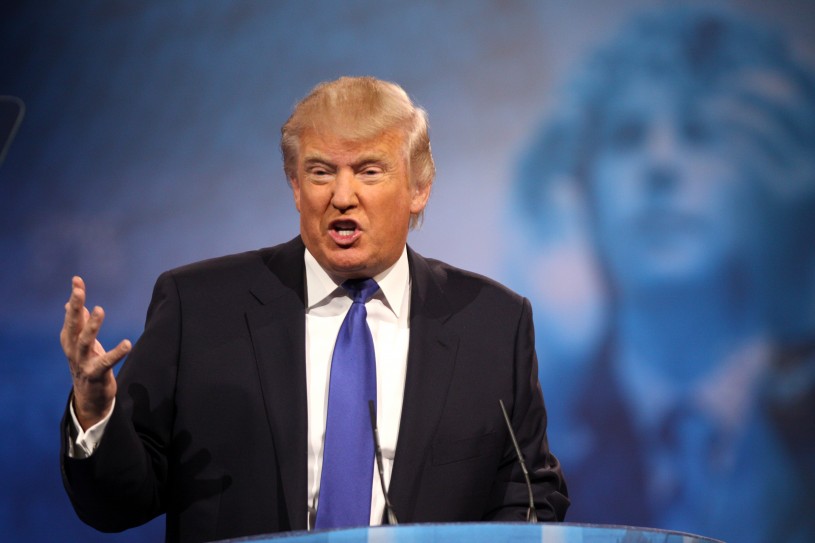
(Image: Gage Skidmore / Flickr)
Most Democrats think a Donald Trump nomination would be a huge gift for Hillary Clinton (assuming she clinches the Democratic nod). And barring a surge from Marco Rubio or Ted Cruz, it looks like he could be the one to duel her for the presidency.
With a policy slate best encapsulated by his vow to “ban all Muslims” from entering the United Stated, Trump’s critics are quick to write him off as the most extreme and unelectable presidential candidate in decades. But racism has had a longstanding place in the United States during times of terror, and Trump’s embodiment of it appeals to a large constituency that’s historically been disaffected in the race for the presidency. Huge swaths of American voters are unmoored from the issues and disenchanted by politics, but they’re “pulsating with grievance and rage,” as Glenn Greenwald put it.
This — and Trump’s notoriety — should wipe the smirk off of the face of the Democratic Party.
Democrats should be wary of underestimating Trump. The hotel magnate is clearly tapping into gut-level emotions that are widely held in an era of government dysfunction. Here are a few statements Business Insider collected from his supporters, even before his notorious remarks about Muslims. Each reflects a pattern in the way his supporters have justified their fierce loyalty:
“Whether it’s the truth or not, I think he tells you the way he feels.”
His supporters view Trump as a vivid hero among seedy politicians. His connection to his audience goes straight past policy initiatives and right to his mastery of the emotional narrative of disaffected conservatives.
His offensive outbursts and frequent factual inaccuracies, according to this view, reflect an authentic personality that shines through the stifling social conventions of a presidential campaign. “I’m owned by the people. I’m no angel,” he explains, “but I’m going to do right by them.”
The routine spells out consistency and genuineness, transcending party lines to try to run the country as he sees fit. Trump appeals to conservatives unbound by the issues and sick of out-of-touch politicians who’ve mired us in gridlock. The more Trump blusters, the more human he seems.
“He won’t be bought off.”
Trump’s name isn’t only useful in terms of name recognition in mainstream America (an advantage, say, Bernie Sanders never had before his run).
It’s emblematic of success. His wealth is the outcome of what he portrays as his unparalleled business smarts, negotiating abilities, and — prized above all — entrepreneurship.
Trump’s business background has also allowed him to appear above the partisan fray. He doesn’t fit neatly into the Republican or Democratic camps, follows no script, and is seemingly genuinely unbound by campaign finance and corporate interests. As he bragged at a campaign speech, “I don’t need anybody’s money. I’m using my own money…I’m really rich, I’ll show you that.”
This is a priceless connection between Trump’s success as a businessman and his potential success in the White House. He can clean America up, his supporters believe, whether that means ethnic cleansing or sweeping away of debt.
“He’s like one of us.”
Trump projects himself as an embodiment of the American dream — be smart, get rich (though having a billionaire family doesn’t hurt). Trump’s narrative as a presidential candidate is that if you try hard enough, maybe you can be as successful as he is — and if you’re not, it means he’s smarter than you. That myth about inequality is as alive and well in white, low-income America.
Trump’s “everyman” appeal, such as it is, goes beyond the American dream. It also delves into deep set American racism. A poll taken last month found that 56 percent of Americans believe that Islam is “at odds” with American values — that’s all Americans, not just Republicans.
Trump’s racist comments, which previously focused on immigrants, have now shifted to Islam. He’s said he would “absolutely” implement a database of Muslims in America, a statement that’s been compared to Nazi Germany’s keeping tabs on the Jews during the Holocaust. The other candidates may be pulled towards Trump’s lean on these issues, but will never convey them with the simultaneous conviction and informality, making his tone and his presence relatable.
While Democrats may be cheering Trump’s popularity today — showing, as it does, an angry and “unserious” Republican voter base that shouldn’t hold up against a mainstream Democratic candidate — dismissing his emotional appeal could be a grave mistake.